
The Oxford Diplomatic Society’s inaugural delegation to Nepal, which took place from April 8 to 18, 2025, has been met with enthusiastic praise from both participants and Nepali stakeholders, who describe it as a milestone in academic diplomacy and cross-cultural engagement. The visit, the first of its kind for the Society in Nepal, brought together a diverse group of students and alumni from Oxford and Cambridge, representing the United Kingdom, China, India, Japan, the United States, and Nepal. Their backgrounds spanned diplomacy, global governance, economics, healthcare, sustainability, investment, and public policy, reflecting the Society’s commitment to fostering the next generation of global leaders.
Throughout the ten-day program, the delegation engaged with a wide variety of Nepal’s political, diplomatic, and grassroots actors. Notably, the group held substantive meetings with Members of Parliament Gagan Thapa and Shishir Khanal, as well as senior officials at the Ministry of Foreign Affairs. These discussions delved into Nepal’s political evolution, the rise of alternative political movements, and the country’s priorities in public health, education, and climate resilience. The delegation also participated in a roundtable at the European Union Delegation in Kathmandu with Ambassador Her Excellency Veronique Lorenzo and other diplomats, focusing on youth engagement and international collaboration. At the British Embassy, members were hosted by Ambassador His Excellency Rob Venn for in-depth conversations with embassy staff about the future of UK-Nepal relations and a dinner reception afterwards.
A key aspect of the visit was the delegation’s journey beyond Kathmandu to Panchakanya Rural Municipality in Nuwakot. There, they met local leaders and the area’s elected MP Hit Bahadur Tamang, forging an agreement to collaborate on promoting sustainable tourism in the region. This field visit underscored the Society’s commitment to supporting rural development and fostering people-to-people connections, echoing broader trends in public diplomacy that link tourism, culture, and sustainable economic growth.
The group’s itinerary also included a visit to British Gurkha Nepal, where Major Dhenga provided a tour and presentation on the Gurkhas’ history, followed by a traditional meal and a behind-the-scenes look at the British Forces Broadcasting Service (BFBS) radio service. These engagements highlighted the deep historical and cultural ties between the UK and Nepal.
Academic and multilateral engagements were a central pillar of the trip. The delegation visited the United Nations Regional Centre for Peace and Disarmament in Asia and the Pacific (UNRCPD), where Director Deepayan Basu Ray welcomed them. The session offered a comprehensive overview of the UN’s disarmament framework and sparked a lively Q&A on conventional weapons control, regional cooperation, and the role of youth and civil society in advancing peace and security. UNRCPD expressed appreciation for the Society’s visit and active engagement, emphasizing the importance of academic partnerships in inspiring future leaders in disarmament and peacebuilding.
Participants also engaged with UNICEF South Asia, the Dolma Impact Fund, the SAARC Secretariat, and the International Centre for Integrated Mountain Development (ICIMOD), exploring issues from child welfare and regional cooperation to climate change adaptation and sustainable investment. Guided tours of Kathmandu’s heritage sites and academic sessions at Tribhuvan University provided further context on Nepal’s rich history and the challenges of business education in emerging markets.
The impact of the trip has resonated far beyond Nepal’s borders. Asmod Khakurel, Nepal Area Contact for the Oxford Alumni Network and lead organizer, remarked that the overwhelmingly positive response “has opened up conversations for more high-level and grassroots trips with international partners across different countries in Asia and Europe.” The visit has positioned Nepal as a model for future academic and diplomatic exchanges in South Asia.
Building on this momentum, the Oxford Diplomatic Society and the Institute for Rural Development signed a Memorandum of Understanding in May 2025 to formalize ongoing academic and development exchanges between Oxford and Nepal, further strengthening the foundation for future joint initiatives.
Participants described the experience as “priceless” and “transformative.” Namo Ata, a British alumnus, said he would definitely recommend the trip “to anyone whether interested in geo-politics or not,” describing it as a priceless experience. Dr. Mohit Bhatara, an Indian alumnus and clinical psychologist, emphasized how the experience “deepened my understanding of diplomacy as not merely statecraft but as a bridge for knowledge transfer, community empowerment, and sustainable development.” Many delegates highlighted the inspiration drawn from Nepal’s resilient communities, the warmth of its people, and the country’s commitment to preserving cultural heritage while embracing innovation.
The visit has been widely praised by both Nepali stakeholders and ODS members. In an official statement, ODS President Michał L. Pietrzak expressed his “sincerest thanks to our wonderful organisers in Nepal, thanks to whom members of the Oxford Diplomatic Society have been able to gain once-in-a-lifetime experiences.” He highlighted the rich itinerary—ranging from institutional visits and cultural explorations to celebrating Nepali New Year—and described the trip as “an unforgettable experience for those who participated, and a wonderful opportunity for the Society to connect with its alumni members across the world.” Pietrzak added, “I hope that this opportunity is far from the last we have to offer, and look forward to exploring future possibilities thanks to our ever-growing network of alumni members, and institutional support.”
Beyond the immediate outcomes for the communities and institutions visited, the Oxford Diplomatic Society’s inaugural trip has helped elevate Nepal’s profile as a destination for meaningful international academic and diplomatic engagement. The delegation’s interactions with policymakers, grassroots leaders, and development organizations have showcased Nepal’s openness to collaboration and its capacity for innovation in areas like sustainable tourism, education, and rural development. Local stakeholders and organizers emphasize that such exchanges foster people-to-people connections, promote knowledge sharing, and inspire new approaches to Nepal’s development challenges—positioning the country as a model for future cross-border partnerships in South Asia.